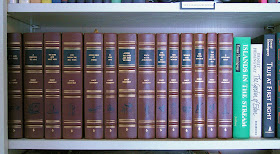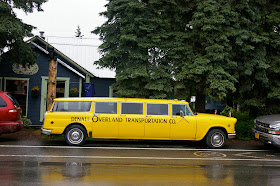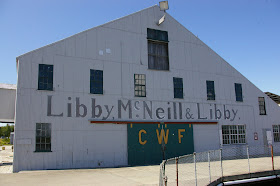 |
| My beloved wooed and won me with coffee. She's still drinking it as shown here at the MOMA in Ft. Worth, Texas this past Easter. |
A Brief History of Bad Coffee
Besides being seductive to my eye and clicking with my peripatetic, curious, word-chasing mind, one of the first things that drew me to my wife was a better cup of coffee.Ugh.
 |
| Thing was, I was such a coffee pagan in those days, that if there was a coupon for it, I'd probably buy it and drink it, taste be damned! |
The packages of Ramen noodles, the cans of Franco American spaghetti and tuna, and that jar of Nescafe I was gesturing toward.
"I found that coffee tastes bitter and bad. That's half the reason it wakes me up. It's like a violent slap in the face in the morning. It's the only way I can get started writing my daily five pages. It also helps me when I begin to sag later in the day."
I even semi bragged about my orange plastic garage sale coffee cup. Each time I made instant coffee in it, the insides grew a deeper shade of gross stained brown. I imagined somehow that this imparted a more intense bad flavor to my morning shot of nastiness.
Well, she was right. And, more, she was a true fresh bean imbibing evangelist. She didn't just talk coffee, she gave coffee to the world. She was ready to enter my life and sweep away the old coffee gods. She would show me the true fresh bean religion. She was no less than the keeper of the coffee keys.
She bought me a plastic cone, some number 4 paper filters, and a glass carafe, and a pound of fresh ground Columbia. My life was about to be upended one cup at a time.
 |
| A Melita duo plus some No. 4 filters introduced me to "real" coffee. |
I was like a man who had clothed himself in haircloth and thought it silk. I was like a man who stared at a match head and thought it was the sun. I was like a man who used bad similes and now threw them all away.
For the real thing. Fresh made, palate pleasing coffee.
It was only the beginning. Soon I would buy my own blade-style grinder. Grinding the beans just before I brewed the coffee meant that the taste was even fresher.
As for beans, I would discover different varieties. The kitchen pantry developed a corner of one shelf devoted to brown bags containing the mild coffees from Central American, the intense ones from Indonesia, the sweetish ones from Africa.
So we got married and we embarked on a coffee adventure, my wife supporting all of my developing whims, even the espresso machine that eventually arrived and the $300 professional grade burr grinder required to make the whole thing come together.
And once, with my head spinning, I ordered Jamaica Blue Mountain beans, the world's most expensive coffee.
 |
| It's all about the beans. |
And another prompting came from my wife. She had learned about the Fair Trade Movement by which the poor growers around the world are freed from the exploitation of coffee plantation owners and large corporations who buy up beans. They are guaranteed a living wage for their work. So we began buying from on-line companies that sell only Fair or Direct Trade beans, including our Big Three, all of which we highly recommend:
Getting to the Good Stuff
The coffee's never been about the equipment or the technique. Rather it's been a simple, shared pleasure over the years. Coffee fits our personalities which are much more similar than opposite. We both like to linger. Sit at a table and finger pages of a book and sip the foam off the top of a latte. Others might be bored. To us it's heavenly.
 |
| A lavish latte at a cafe-bakery on Dickson Street in Fayetteville, Arkansas earlier this year. |
When we finally had a child, not much changed. We started taking our son to coffee shops with us. He heard the sound of milk being foamed long before he ever saw or heard a television set. Someday when he thinks back on his childhood he'll likely remember how our house smelled in the morning.
Coffee, coffee, coffee.
 |
| Half the pleasure of coffee in Paris was putting to use my high school French and ending up with all these great pastries. Ils comprendes moi! |
 |
| The rain was pouring down in Riomaggiore, Italy, but the two of us were cozy looking out the window, sipping our cafes au lait. |
 |
| Outside Talkeetna, Alaska there's a cafe where they artfully swirl the foam, not just on top, but all the way through the head...! |
For me, it is part of a good life to hold in hand this magical drink fashioned from bright red berries grown at high altitudes in various corners of the world. Other couples likely have something else they share.I'm talking about an old reliable that without words or pointing it out they can indulge in it and know that the other partner is taking equal enjoyment. Wine. Dining out. NASCAR. Hiking. Friends reruns. Whatever...
If you don't yet have something you mutually love, maybe you can find it by converting your significant other away from his/her equivalent of crappy coffee. Don't underestimate your influence. It could be that he or she is like I was: I just didn't know any better, I was ready for a loving, helpful teacher.
Share your passion and it could be the start of what Mr. Humphrey Bogart calls "a beautiful friendship." It worked for me. Happy anniversary, dear! - V.W.
.








































